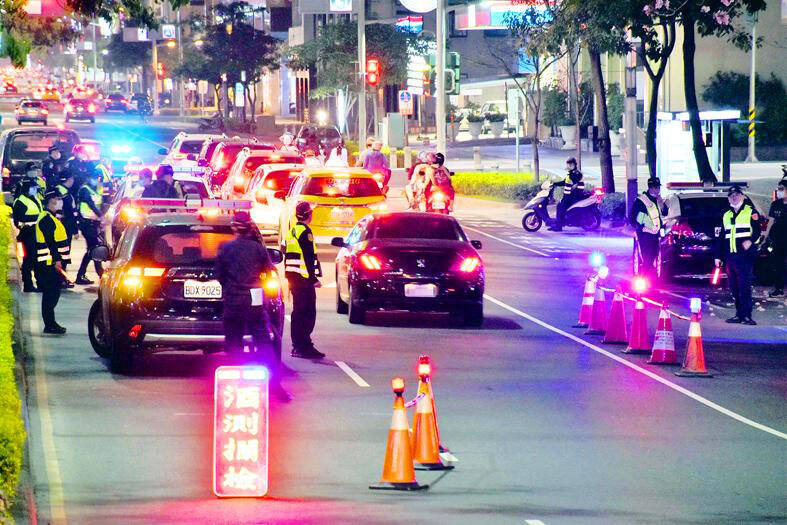The Ministry of Transportation and Communications yesterday pledged to clarify regulations to mandate a two-year license plate suspension for drunk driving, regardless of whether the vehicle is owned by the driver.
The Supreme Administrative Court in February ruled that a vehicle’s license plate would be suspended in a driving under the influence (DUI) case only when the driver and the owner of the vehicle are the same person, but the ministry is seeking to make that penalty applicable in all instances.
The latest version of Article 35 of the Road Traffic Management and Penalty Act (道路交通管理處罰條例), which went into effect in March 2022, states that the penalty for an owner “knowing” a person is drunk and allowing them to drive their vehicle is a fine and a two-year license plate suspension.

Photo: Huang Liang-chieh, Taipei Times
The court had previously ruled in favor of a vehicle owner who sued after their plate was suspended following a DUI charge against their son for driving their vehicle.
The court ruled that although Article 35, Paragraph 7, does specify that the vehicle owner is subject to penalties, including a license plate suspension, Article 35, Paragraph 9 does not do so explicitly.
To abide by legal principles, authorities can only suspend a vehicle’s license plate when the owner and driver are the same person, the court ruled.
Department of Public Transportation and Supervision Director-General Lin Fu-shan (林福山) told a news conference in Taipei that the ministry would seek to amend the law to merge the paragraphs to remove ambiguity.
The ministry held discussions with the Ministry of Justice, the Ministry of the Interior and local governments, and agreed to respect the court’s ruling, he said.
Under the current regulations, if a vehicle owner is aware that another person is drunk and still allows them to drive their vehicle, the owner can still be penalized, Lin said.
However, the transportation ministry would amend the act so that any vehicle driven drunk would have its license plate revoked, he said.
It would submit a motion for an amendment during an upcoming review session by the legislature’s Transportation Committee, he said.
If the motion passes and the legislature approves the amendments, the new penalty standards could go into effect within six months, he added.

Taiwanese were praised for their composure after a video filmed by Taiwanese tourists capturing the moment a magnitude 7.5 earthquake struck Japan’s Aomori Prefecture went viral on social media. The video shows a hotel room shaking violently amid Monday’s quake, with objects falling to the ground. Two Taiwanese began filming with their mobile phones, while two others held the sides of a TV to prevent it from falling. When the shaking stopped, the pair calmly took down the TV and laid it flat on a tatami mat, the video shows. The video also captured the group talking about the safety of their companions bathing

US climber Alex Honnold is to attempt to scale Taipei 101 without a rope and harness in a live Netflix special on Jan. 24, the streaming platform announced on Wednesday. Accounting for the time difference, the two-hour broadcast of Honnold’s climb, called Skyscraper Live, is to air on Jan. 23 in the US, Netflix said in a statement. Honnold, 40, was the first person ever to free solo climb the 900m El Capitan rock formation in Yosemite National Park — a feat that was recorded and later made into the 2018 documentary film Free Solo. Netflix previewed Skyscraper Live in October, after videos

Starting on Jan. 1, YouBike riders must have insurance to use the service, and a six-month trial of NT$5 coupons under certain conditions would be implemented to balance bike shortages, a joint statement from transportation departments across Taipei, New Taipei City and Taoyuan announced yesterday. The rental bike system operator said that coupons would be offered to riders to rent bikes from full stations, for riders who take out an electric-assisted bike from a full station, and for riders who return a bike to an empty station. All riders with YouBike accounts are automatically eligible for the program, and each membership account

A classified Pentagon-produced, multiyear assessment — the Overmatch brief — highlighted unreported Chinese capabilities to destroy US military assets and identified US supply chain choke points, painting a disturbing picture of waning US military might, a New York Times editorial published on Monday said. US Secretary of Defense Pete Hegseth’s comments in November last year that “we lose every time” in Pentagon-conducted war games pitting the US against China further highlighted the uncertainty about the US’ capability to intervene in the event of a Chinese invasion of Taiwan. “It shows the Pentagon’s overreliance on expensive, vulnerable weapons as adversaries field cheap, technologically